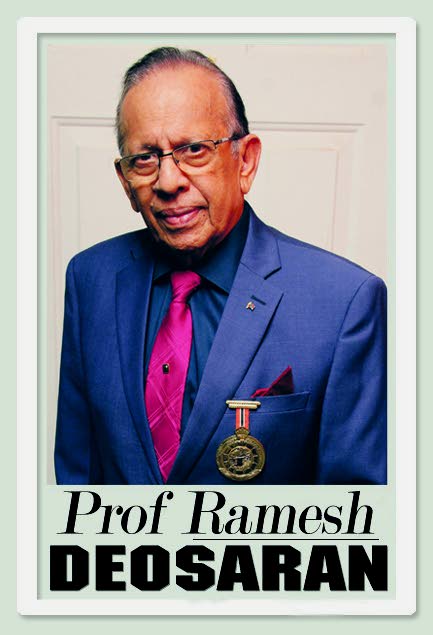How will election solve crime?

THE coming election is likely to be a real rough-and-tumble exercise, with the exact date still a mystery.
Look, while quite legal, I don’t agree with any prime minister's having the prerogative to set the date any time he or she finds it convenient. The election date should be fixed by statute with provisions for emergencies. This makes for a fair and free election and equal opportunity – not a political lottery.
Put the country’s welfare beyond party interest. An election date in a democratic country is too important for undue speculation. It affects private lives, business and investor planning. This should be a campaign issue.
Dr Keith Rowley’s PNM promises reforms to campaign finance, public integrity, etc, but not yet a fixed election date. While the opposition UNC has branded constitution reform “political gimmickry,” its election campaign will gain voter respect if it adds some constitution reform issues to its published list of day-to-day problems.
Of course, it is certainly not a happy moment to regularly read or hear about the many grievances and day-to-day problems of our citizens, from murders and home invasions, high food prices, growing unemployment, school failures and dropouts, foreign-exchange troubles, traffic nightmares, chaotic property taxation, courthouse congestion to a broken political and parliamentary system.
The terror is that many of these problems affect rich or poor, PNM or UNC, old or young, male or female, residents gated or not. And it is overdue for the government to explain why and what solutions are in store. The troubled population cannot be left to wonder what the election will do to help solve their many problems.
And now they coming with a “cashless” society? Our troublesome technological systems are now so deficient and unreliable. Ordinary people are asking, what about the recent worldwide internet crash? Online payments are now so troublesome. Criminal hacking into banks and security agencies are now dangerously common. Trust in our national accounting systems has deteriorated, fuelling capital flight. The changing of dollar notes was a nightmare, especially for senior citizens.
Ordinary people now feel right to ask: who really does their elected government represent?
Dr Rowley’s recent remark about his responsibility hasn’t improved the population’s confidence in government. He even doesn’t know how to accept the kind of help he needs.
Newsapaper-letter-writer Rudy Chato Paul Snr teasingly stated: “A question posed over the years is: are we better off today than we were pre-independence…when we examine the failures of state institutions one cannot help but wonder.”
Also using his democratic right, Curtis Anthony Obrady’s letter expressed a popular view: “It is with deep frustration and a heavy heart that I pen this letter, reflecting on the nine years that have passed under the leadership of Keith Rowley…These years have been marked by poverty, inequality and a distressing rise in crime. The pervasive sense of hopelessness and despair among our people is palpable.”
The government should explain.
This is what people are saying through the airwaves and print media. So as a lively but troubled democracy, some high official in government must respond or defend – be it Dr Rowley, Mr Imbert, Mr Stuart Young, SC, or even Mrs Camille Regis-Robinson. What about National Security Minister Fitzgerald Hinds or new Minister Keith Scotland?
Over the years, elected ministers and governments have shown scant regard for citizens’ public opinion, even rebuking them – and forcing many citizens to seek shelter under political correctness and away from victimisation.
All this and more raise the question: how will an election help solve the country’s problems? Whichever party wins, it will be difficult to succeed within the current political and parliamentary systems. Any new wine will not properly fit in the old bottles. Our institutions and political infrastructure are in prolonged disrepair.
And Dr Rowley has limited time now. Sometimes I wonder, who really are his advisers?
People are so fearful and preoccupied with their day-to-day problems that they may not have much time to consider the active connection between such constitutional matters as lack of political accountability, Cabinet ineffectiveness and inefficiency.
It is a civic duty now for citizens to consider government explanations alongside what the opposition is offering as constitutional and policy remedies. For example, the opposition calling for political accountability in Parliament or through parliamentary select committees is like shadow-boxing – not when the executive (PM and Cabinet) effectively controls the legislature.
Separate the executive from the legislature. And have an executive president elected by the population to facilitate this. It is either we move to fuller democracy, or remain dictatorial on one side and as shadow-boxers on the other side. Let’s start to do the hard work for the country.
Whatever its performance weaknesses, the PNM appears to be a stable party under party rules. The opposition UNC seems likely to face “alliance” and dissident challenges before the elections.
Of course, the ground-level issues are now much on UNC leader Mrs Kamla Persad-Bissessar's side, tempting her and her executive to “go it alone” with honour and integrity. Dissident Mayaro MP Rushton Paray has cooled down a bit, still party loyal, while Chaguanas West MP Dinesh Rambally is still sticking to his early concerns. With or without Vasant Bharath and some important “prodigals,” Paray and Rambally, if not reconciled, may cause her some unease.
Whatever the current worth of existing “third parties,” the other option about alliance is to do what several other countries do – consider manifesto-driven alliances after, not before, the elections – and how all that will help reduce murders, home invasions, corruption, etc.

Comments
"How will election solve crime?"